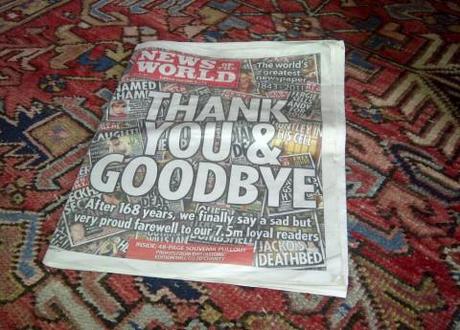
The final edition of The News of the World. Photo credit: Archie Thomas
But just as the friendly, high street bank clerk, who sympathetically coaxes regulars through their financial problems, bears no resemblance to a city trader who plays high stakes roulette with a pensioner’s life savings, not all journalists are the same.
A number of those in the frame in hackgate began their careers as community crusaders on local newspapers. Forgive my romanticism but, back in the day, I and plenty of my colleagues really did want to change the world through the power of the press, standing up for the downtrodden and exposing the villains. We did care when we wrote about the campaign to save the old folks home, vote rigging on the local council or the single parent forced to live in a damp-ridden room. We lived alongside our readers, talked to them in the pub, felt their pain. When a story went national and you staked out the interviewee’s home with the press pack, it was often just you they let in. Why? Because they trusted local journalists.
Of course the regional press weren’t and aren’t just avenging heroes. There’s still intense competition, ambition, the thrill of the chase and the deadline. And it’s an addictive and potentially dangerous mix. When someone in your circulation area meets an untimely death through crime, accident or mystery illness, a reporter is routinely dispatched to do a “death knock”. Some grief-stricken relatives welcome you in, finding something cathartic about pouring their feelings out to a complete stranger, gaining comfort from the article that follows. Others slam the door in your face, their eyes filled with loathing. For them, you have made an already unbearable situation even worse. Does the fact that you were “just doing your job” really excuse the misery you have caused?
The BBC, and I can’t speak from experience with other broadcasters, feels more akin to the local press in terms of accountability, even at national level. You are less likely to meet your interviewees again in the street, but you are a public broadcaster – there are editorial guidelines, an internal code of conduct and you have to take responsibility for your actions. Listeners (Radio Four ones don’t miss a trick) have a right to be heard and programme editors have to explain their decisions, on air if the audience demands it. Does this make you think twice as you are putting a news programme together? You bet it does.
As in banking, the higher you climb the newspaper ladder the more intense the competition, the more pressure to succeed. If you can’t take the heat there is always someone just as capable waiting right behind you to fill your shoes.
Under that kind of pressure, is it any wonder the journalist writing an expose about a celebrity’s coke habit has one of their own or that the hack investigating the infidelity of a “family man” politician is doing just the same? Certainly it’s hypocritical, but if they are not reaping the rewards of celebrity status or being elected under false pretences is it morally wrong?
Arguably every journalist at every level has some blood on their hands.
Like Robin Hood bankers who quietly redistribute their wealth by sponsoring a sports coach on a deprived estate, there are of course still national newspaper journalists whose integrity remains largely intact, who stand up for Joe Public and expose the villains, poised for their Watergate moment. Success and power don’t have to corrupt.
But as in the world their job is to reflect, laws and regulation are necessary for those who don’t share the same moral compass as the majority. The actions of rogue bankers and journalists impact on real human beings and shatter real lives.
And once the trust in a profession has been broken it has to be earned again.

